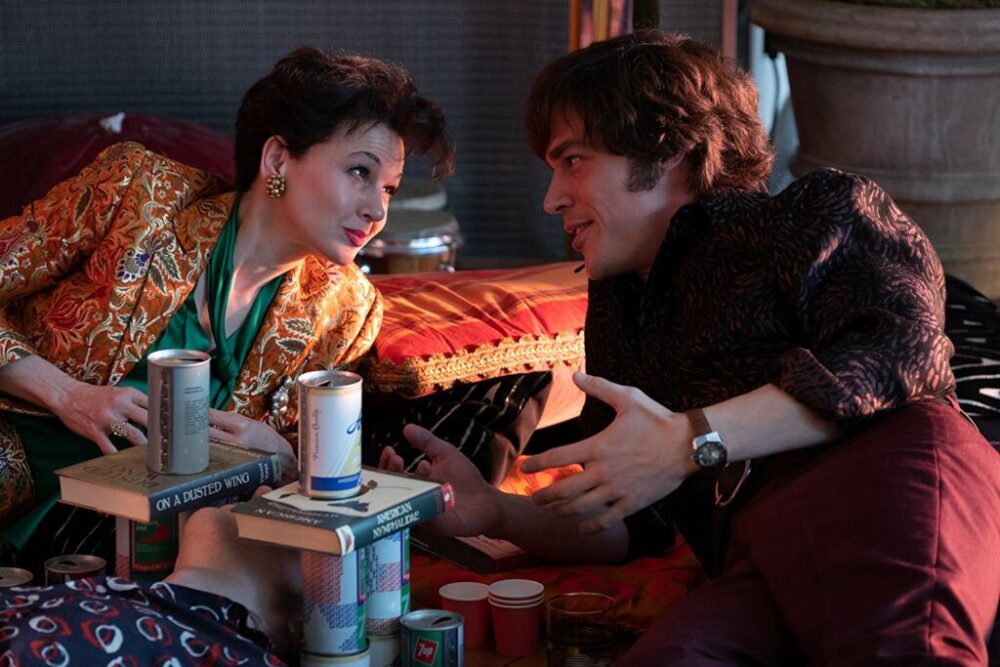“Judy” opens in on a conversation between a 13-year-old Judy Garland and her manager/producer/head of MGM Louis B. Mayer, literally behind closed doors on the sets of “The Wizard of Oz,” the movie that catapulted Garland to superstardom and cemented her status as America’s sweetheart.
A young and naïve rosy-cheeked Garland wishes for some time away from the spotlight so she can go to the pictures with her friends and resume a normal life outside of Hollywood’s glitz and glamour. Mayer, however, has other plans for the child star; plans which will benefit him more than they will benefit her.
“Judy”: A Revealing Look Inside a Tortured Soul
The film then cuts to Garland in her 40s. The starlet is fighting a losing battle with alcoholism and substance abuse while still harboring desires of a slowed down, less demanding lifestyle. For her, it’s a life that’s independent of fame; perfect to spend more time with her kids who are in the custody of her third husband. However, Garland’s dreams still come at the exhausting cost of continuing to perform day in and day out for the rest of her living days. The very stage and audience that brought her happiness and success along with pain and loneliness, now push Judy to the brink of suicide and siphon her life and energy.
“Judy” portrays Garland as somebody who enjoys performing despite the toll on her health, but who despises others’ control over her. This is due to her trauma-inducing prior experience with uncaring managers such as Mayer; who viewed her as nothing but a ‘disposable pretty girl from the Midwest who brought audiences flooding into the theatres’.
Garland also suffers mistreatment from her own mother, less of a maternal figure and more of a strict, tyrannical manager whose parenting style mainly involved pumping her daughter with pills; which eventually led to Garland’s struggles with substance abuse and an untimely death.

A Manufactured Childhood for Commercial Viability
The film juxtaposes scenes featuring Garland’s mother arranging for sleeping pills for a teen Garland, with the older Judy preparing some warm milk for her own son to help him sleep. This further helps showcase the vast difference between the parenting styles of both Judy and that of her uncaring and toxic mother.
In addition, flashbacks transport us to a teenage Judy’s manufactured life. With much of her childhood spent on set, she pretends to eat junk food for the paparazzi. Instead, she survives on pills and chicken soup behind the scenes so that she wouldn’t end up piling on weight and lose out on roles. Add to these the constant threats with dire consequences—such as ostracism from the gatekeepers of Hollywood who paid her bills—if she so much as even rebelled against them.
Even the media refuses to portray Judy as anything but a ‘best friend/girl next door trope’ manufactured by Hollywood to attract young audiences and sell tickets. This also includes labeling her as someone who ‘enjoys pizza just like every other girl’ even though she struggles with eating disorders and is severely underweight due to the strict diet imposed upon her. Later, the older Judy anxiously frets that the media might even label her as the distant, absentee mother.
On the Byproducts of Hollywood’s Toxicity
The only people shown in the film who display even a slight bit of sympathy and humanity toward Judy are her young assistant Rosalyn who, unlike Judy’s prior managers and employers, is often aware of the immense amount of pressure that Judy undergoes; and a gay couple whom she encounters in London after one of her performances who offer to take her out to dinner.
While I’ve since learnt that the latter is just an added embellishment and a dramatized account; it does help paint Garland as a lovable and down-to-earth human being who is more than just the larger-than-life onstage figure. Moreover, it establishes her image as a beloved LGBTQIA+ icon.
And while I could clamor on about historical accuracies due to such creative liberties; these only further made me question whether anybody really truly did care about Garland behind the scenes as much as they adored her for her onstage persona. Or was she really forced to face her toils and troubles solo ’til the end? I fear that the answer to my question is obviously the latter. After all, Judy Garland isn’t the singular example of a celebrity who was haunted and deceived by poor management and by substance abuse brought on by the pressures of an unforgiving industry. In fact, in the modern era, celebrities like Britney Spears and Lindsay Lohan too have faced similar issues like Judy well into their adult lives.
Zellweger’s Garland: A Performance Worthy of the Statuette
Watching Renée Zellweger’s performance as Judy Garland made me realize that she earned every inch of her Oscar statuette. Zellweger is a show stopper, nothing short of dazzling in the musical numbers that require her to showcase Garland’s trademark energetic attitude. She also nails Garland’s sheer grace, class, and a transfiguring yesteryear-esque charm with her mannerisms. More importantly, she is also effortlessly able to convey the sense of fatigue in Garland’s faltering voice, particularly in the scenes detailing the starlet’s final few performances during her London concerts.
The supporting cast also do justice to their roles; but I would single out Darci Shaw as the young Garland, and Jessie Buckley as Rosalyn who both deliver extremely memorable performances and hold their own alongside Zellweger.
I highly recommend checking out ‘Judy’ because it isn’t just a biopic; it’s also a wake up call, or rather a tell-all, on everything that’s wrong with an industry that’s coveted by many and even viewed as the opportunity of a lifetime. It’s very much like a rainbow with a pot of gold at its end, albeit one that also comes at a heavy and grave cost.
Support the Site: Consider becoming a sponsor to unlock exclusive, member-only content and help support The Movie Buff!